Contain the Rain – Stormwater Cost Share Program
Overland Park’s stormwater cost share program encourages residents and business owners to incorporate stormwater management strategies on their properties. These tactics reduce stormwater runoff and improve water quality.
Overland Park budgets funds for a cost share program to offset the costs of stormwater management projects that capture, slow down, or soak up stormwater close to its source.
Funding is available to applicants on a first-come, first-served basis and is subject to the approval of the Public Works Department. Projects that are required to meet stormwater treatment requirements of the City’s building and construction code will not receive funding. Applicants are responsible for ensuring projects follow City ordinances and meet homeowners association requirements (if applicable).
To apply, you will need:
- Map or diagram of property with project location and dimensions (where applicable).
- Estimated cost.
- Approximate timeline.
- Summary of project.
After applying, please wait for email confirmation and approval before beginning your project. Once your project is complete, City staff will ask you to share before and after photos of your project along with any receipts before receiving reimbursement funds.
Eligible Projects
The City will help cover the costs of materials and contractor labor to install many stormwater treatment projects (limit of one project per household, per year). Residents may be reimbursed for the purchase of certain native plants using the cost share program. Any native plants not currently listed below must receive approval prior to purchase to ensure reimbursement.
- Rain and Pollinator Gardens
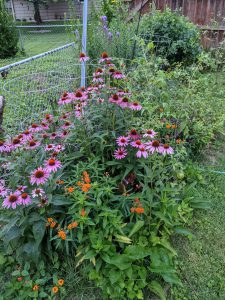 Planting native landscaping reduces the amount of surface runoff that flows into our waterways. It helps rain infiltrate into the ground slowly to recharge streams, lakes, and wetlands at a more natural pace.
Planting native landscaping reduces the amount of surface runoff that flows into our waterways. It helps rain infiltrate into the ground slowly to recharge streams, lakes, and wetlands at a more natural pace.Stormwater runoff that flows through native landscapes is filtered, and contaminants are removed by plants and soil, results in cleaner, safer water.
Overland Park will cover 50 percent of the cost of a rain or pollinator garden, up to $1,000.
- Rain Barrels
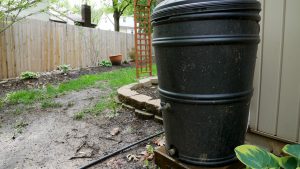
Rain barrels may be up to 200-gallon barrels that capture water that would otherwise go down storm sewers. They can help divert and collect water from around your foundation to reduce foundation or flooding issues. The water collected may be used to water trees, flowers, gardens, etc.
Cover any openings with a screen to prevent mosquitoes from reproducing in the standing water. Rain barrels should also be drained and cleaned in the fall to keep water from freezing in the barrel.
Rain barrels can be incorporated into your landscaping by planting or screening around the barrel. They are subject to applicable laws, including, but not limited to, the city property maintenance codes.
Overland Park will cover 50 percent of the cost of a rain barrel, up to $75 per barrel (limit of two).
- Native Tree Plantings
Native trees help reduce the amount of water runoff by taking up water from the soil through their roots. Compared to non-native trees, native trees are better adapted to our climate and require minimal maintenance, including water and fertilizer.
Overland Park will cover 50 percent of the cost of native tree plantings, up to $150 per tree (limit of two). Trees must be included on this list to qualify for the city’s cost share program.
- Native Buffers
Overland Park will cover 50 percent of the cost of native buffers, up to $1,000.
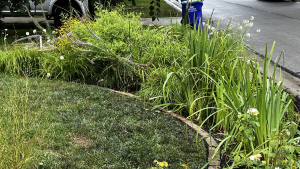
Buffer strips, sometimes called filter strips or biofilters, are gently sloped areas of vegetation and landscaping installed between or at the edge of impervious surfaces and turf areas. Stormwater runoff from sidewalks, driveways and streets, and irrigation overspray from turf areas is captured and filtered through vegetated buffer strips instead of draining onto the street.
Buffer strips are most effective when planted with drought-tolerant vegetation that requires minimal watering. They should be installed over soils that have adequate infiltration rates.
- Native Swales
Overland Park will cover 50 percent of the cost of native swales, up to $1,000.
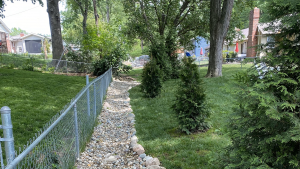
Swales, sometimes called bioswales, are shallow, gently sloped vegetated open channels that slow down runoff, filter out stormwater pollutants and allow some infiltration to occur. They can be designed as a form of bioretention and can also be used to convey stormwater runoff in place of pipes or ditches. As water flows along the swale, it is slowed down by the plants and the roughness of the landscaped surface. This allows sediments and pollutants to drop out and be processed by the plants and soil. Some stormwater soaks into the soil and is used by plants, and, depending on existing soil conditions, some stormwater infiltrates and provides groundwater recharge. Some water continues to flow downhill in the swale, but at a slower rate and sometimes at a lower volume than would flow through conventional storm pipes.
- Riparian Plants
Riparian plants cover land along stream banks, absorbing water and energy during storms and reducing the impact of flooding.
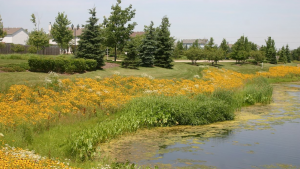
Overland Park will cover 50 percent of the cost of riparian plants, up to $1,000.
- Rain Cisterns
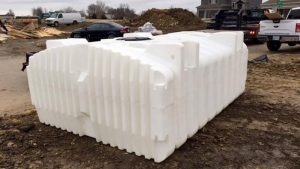 Rain cisterns are water collection systems installed above or below ground, typically collecting 200+ gallons. Overland Park will cover 50 percent of the cost of a rain cistern, up to $500.
Rain cisterns are water collection systems installed above or below ground, typically collecting 200+ gallons. Overland Park will cover 50 percent of the cost of a rain cistern, up to $500.- Permeable Pavement
Permeable pavement is a porous surface that catches precipitation, allowing it to slowly infiltrate into the soil.
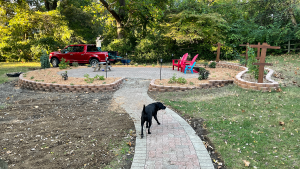
Types of permeable pavement include:- Porous asphalt
- Concrete grid pavers
- Plastic reinforcement grid
- Porous concrete
- Permeable interlocking concrete pavers
- Natural rock pavers
Permeable pavement should be used in areas that would otherwise be covered with an impermeable surface to be included in the cost share program.
Overland Park will cover 50 percent of the cost of permeable pavement, up to $1000.
- Soil Restoration
Poor soil can make it difficult to know what type of plants will grow, how/when to apply chemicals (like fertilizers and pesticides) and prevent water from soaking into the ground. In order for soil restoration to be considered for reimbursement through the cost share program, you will need to get a free soil test done from the K-State JOCO extension office, then increase the organic matter by 1-3% through adding compost, manure, etc. You will then need to get your soil retested (the second test will not be free but you can include it in your cost share materials).
Overland Park will cover 50 percent of the cost of soil restoration, up to $1000.
- Floating Wetlands
Floating wetlands are container gardens that float on the surface of water.
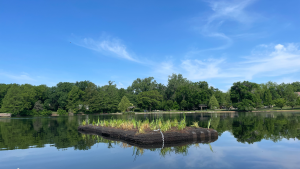 Local marsh and wetland plants filter pollutants in the water.
Local marsh and wetland plants filter pollutants in the water.Overland Park will cover 50 percent of the cost of floating wetlands, up to $1000.
- Dry Well/Seepage Pits
A dry well, also called a seepage pit, is an underground storage facility that temporarily stores stormwater runoff. Pipes installed to drain water from roof gutters can directly connect to the dry well, which may be a gravel-filled pit, a prefabricated storage chamber made from plastic, concrete or a pipe segment. Runoff flows into the dry well and slowly drains or infiltrates into the surrounding soil. In the event of a heavy storm or frequent storms, an overflow pipe is used to ensure any additional runoff is safely directed downstream.
Overland Park will cover 50 percent of the cost of a dry well or seepage pit, up to $500.
Stormwater FAQs
- What is stormwater?
Stormwater is the water that is generated when rain, snow melt, and surface drainage flows over land or impervious surfaces and does not percolate into the ground. Impervious surfaces are defined as hard surfaces where water is unable to soak or infiltrate into the ground, such as streets, parking lots, sidewalks, and rooftops.
- Where does stormwater go?
As stormwater flows over land and impervious surfaces, it picks up sediment, contaminants, trash, nutrients, and other pollutants which then end up in the waterways of Overland Park untreated. Unmanaged stormwater adversely affects these waterways by causing water pollution, stream bank erosion, and flooding.
- What can I do?
By capturing stormwater close to its source, slowing it down, and/or allowing it to be soaked up by plants and soil, pollutants and sediment are removed. This helps improve the water quality of our streams, creeks, and ponds as well as downstream in the Kansas and Missouri rivers.
- Can cultivars be planted using the Cost Share Program?
Nativars are okay to use in the Cost Share Program, cultivars are not. Please refer to the native plant list on the OP website for acceptable plants.
Overland Park strives to promote true native plants as research has shown they best serve the goals of promoting water quality, reducing the use of resources, and providing resources for native pollinators.
Many native plants have been manipulated to change or enhance certain qualities such as color or size. These are called ‘cultivars’ or ‘nativars’ (cultivars of native plants). The key to knowing if you have a cultivar or nativar is to look for the scientific name on the plant tag. True natives will just be the two word scientific name (Purple Coneflower is Echinacea purpurea). Cultivars/nativars will have a common name in single quotations or an “X” indicating what was crossed. For example, a common nativar of coneflower is Echinacea purpurea ‘Bright Star’. A cultivar may be written Echinacea ‘Daydream’ or Echinacea purpurea x laevigata. Both of these indicate a cross between two species – the first leaves off the species information, the second tells you which species were crossed.
You can learn more about the differences in this webinar from the Missouri Prairie Foundation.
Please reach out for assistance.
Julie Roberts / [email protected]
Cloey Adrian / [email protected]
Related Links
Civil Engineering Stormwater Resources
See the city’s stormwater management requirements for public projects.
Contain the Rain
Contain the Rain is a Johnson County program and a regional resource for sustainable landscaping solutions that benefit stormwater management efforts.
Planting Natives in Kansas City Metro
View native plant information and tips from the Master Gardener’s of Johnson County.
